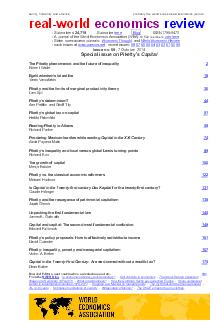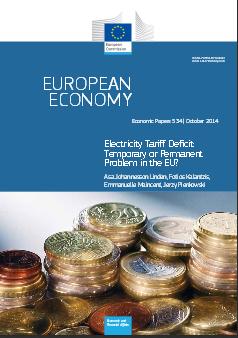Mitchell, B. (2014) “The German ship is sinking under the weight of its own delusions“, Bill Mitchell Blog: Modern Monetary Theory… Macroeconomic Reality Blog, 16 Οκτωβρίου. Eurostat’s recent publication (October 14, 2014) – Industrial production down by 1.8% in euro area – rightfully sends further alarm bells throughout policy makers in Europe, except I suppose Germany where denial seems to be rising as its industrial production levels fall to …Read More
The mythical Phillips curve?
Wren-Lewis, S. (2014) “The mythical Phillips curve?“, Mainly Macro Blog, 14 Οκτωβρίου. Suppose you had just an hour to teach the basics of macroeconomics, what relationship would you be sure to include? My answer would be the Phillips curve. With the Phillips curve you can go a long way to understanding what monetary policy is all about. My faith in the Phillips curve comes from simple but highly plausible …Read More
The sources of firms’ success
Hottman, C., Redding, S. & Weinstein, E. D. (2014) “The sources of firms’ success“, VoxEU Organisation, 14 Οκτωβρίου. Recent research highlights that important factors for firm size are costs, quality, markups, and product scope. This column explores the sources that make these factors differ across firms. Quality and in particular, variation in the product scope, is the chief determinant of firm sales. Marginal cost variations do not matter much …Read More
The great mortgaging
Jordà, Ο., Taylor, A. & Schularick, M. (2014) “The great mortgaging“, VoxEU Organisation, 12 Οκτωβρίου. The Global Crisis prompted Lord Adair Turner to ask if the growth of the financial sector has been socially useful, catalysing an ongoing debate. This column turns to economic history to investigate whether the financial sector is too big. New long-run, disaggregated data on banks’ balance sheets show that mortgage lending by banks has …Read More
Real-World Economics Review, Special issue on Piketty’s Capital
World Economics Association (WEA) Real-World Economics Review, Issue no. 69, 07 October 2014 Special Issue on Piketty’s Capital. Economists and other social scientists tend to study “problems”. Issues not studied tend to be seen as “natural”. “Poverty” and the “poor” are problems, the subject of a vast social science literature. Inequality, income concentration, the behaviour and influence of the super-rich tend to be treated as part of the natural …Read More
Systemic equilibrium in a Bretton Woods II-type international monetary system: the special roles of reserve issuers and reserve accumulators
Austin, Κ. (2014) “Systemic equilibrium in a Bretton Woods II-type international monetary system: the special roles of reserve issuers and reserve accumulators“, Journal of Post Keynesian Economics, 2014, vol. 36, issue 4, pages 607-634. This article develops a model, based on balance-of-payment identities, of the new international monetary system (Bretton Woods II or BWII). It shows that if some countries engineer current account surpluses by exchange-rate manipulation and foreign-reserve …Read More
Electricity Tariff Deficit: Temporary or Permanent problem in the EU?
Johannesson Linden, Α., Kalantzis, F., Maincent, E. & Pienkowski, J. (2014) “Electricity Tariff Deficit: Temporary or Permanent problem in the EU?“, European Economy. Economic Papers. 534. Οκτώβριος. In the recent years electricity tariff deficits emerged in Spain, Portugal, Greece and in some other Member States. Tariff deficits are shortfalls of revenues in the electricity system, which arise when the tariffs for the regulated components of the retail electricity price …Read More
The Effects of a Money-Financed Fiscal Stimulus
Galí, J. (2014) “The Effects of a Money-Financed Fiscal Stimulus“, Centre for Economic Policy Research, 24 Σεπτεμβρίου. I analyze the effects of an increase in government purchases financed entirely through seignorage, in both a classical and a New Keynesian framework, and compare them with those resulting from a more conventional debt-financed stimulus. My findings point to the importance of nominal rigidities in shaping those effects. Under a realistic calibration …Read More
Why Italy Will Not Make It
Orsi, R. (2014) “Why Italy Will Not Make It“, LSE EUROPP, Eurocrisis in the Press, 01 Οκτωβρίου. Three articles by prestigious commentators (Ambrose Evans-Pritchard and Roger Bootle for The Telegraph, Wolfgang Münchau for Financial Times) have recently appeared in the financial press about the economic situation of Italy and the (in)stability of its national debt. The arguments and wording of these pieces deserve special attention, as their appearance may …Read More
Re-discovering the Phillips curve
Andor, L. (2014) “Re-discovering the Phillips curve“, VoxEU Organisation, 01 Οκτωβρίου. Negative real interest rates imply redistribution from savers to debtors. This column, by the EU Commissioner for Employment, Social Affairs and Inclusion, argues that such redistribution would benefit the whole economy. It would strengthen aggregate demand – including investment demand – at time when such a boost is clearly needed. As a contribution to the EU’s institutional transition, …Read More







